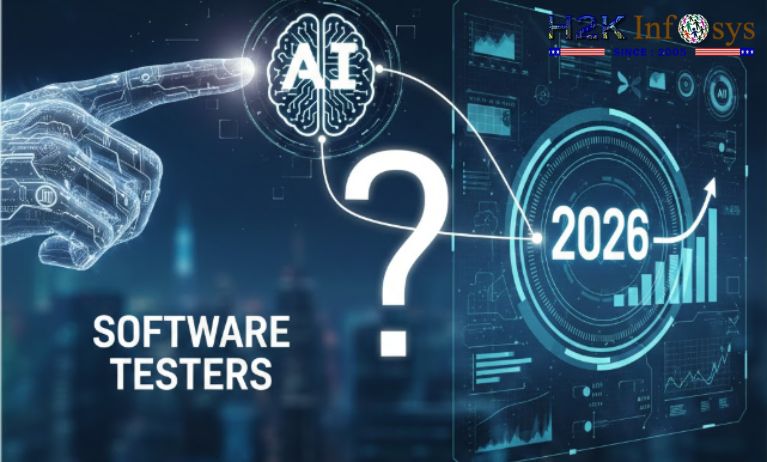Introduction
In today’s fast-paced digital economy, businesses are evolving at breakneck speed. From cloud computing and artificial intelligence to automation and data analytics, technology is reshaping how companies operate. Amid this rapid transformation, one role stands resilient and increasingly essential: the Business Analyst Training. But why is Business Analyst Online Training considered future-proof, especially in such a tech-driven world.
This explores the growing relevance of business analysts, the skills they need, and how formal training ensures long-term career success even in an environment dominated by automation and AI.
The Role of a Business Analyst in the Digital Age
In today’s fast-paced digital economy, businesses are transforming rapidly through technologies like artificial intelligence, cloud computing, automation, and big data. Amid this evolution, the role of a Business Analyst (BA) has emerged as one of the most critical functions in any organization. Far from being confined to documentation and spreadsheets, modern BAs are strategic thinkers who drive digital transformation, enable smarter decisions, and align business objectives with technological solutions.
A Business Analyst acts as a bridge between stakeholders and technical teams. They translate business needs into functional requirements, ensuring that projects meet their goals while remaining feasible, efficient, and user-friendly. In agile environments, BAs work closely with product owners, developers, and quality assurance teams to ensure continuous improvement and alignment with customer expectations.
In the digital age, BAs are no longer limited to traditional industries. Their expertise is in demand across sectors like finance, healthcare, e-commerce, manufacturing, and IT services. Whether it’s streamlining operations with automation, optimizing customer journeys through data analysis, or helping organizations navigate compliance challenges, business analysts bring structure and clarity to complex challenges.
Moreover, their role now includes data literacy, an essential skill in a world where decision-making is increasingly data-driven. BAs must interpret data trends, identify performance gaps, and suggest actionable insights that guide business strategy. They often work with tools like SQL, Power BI, Excel, and Tableau to derive meaningful reports that support stakeholders in making informed decisions.

As businesses invest more in digital products, cloud migration, and AI-powered tools, the demand for skilled Business Analysts continues to rise. These professionals ensure that technology serves business goals rather than the other way around. Their ability to adapt, analyze, and communicate makes them indispensable in modern enterprises.
In essence, the Business Analyst in the digital age is not just a facilitator they are a catalyst for innovation, change, and sustainable growth.
Key Functions of a Modern Business Analyst:
- Understanding business objectives and aligning them with tech strategies
- Conducting data analysis to support decision-making
- Drafting requirement specifications and use cases
- Collaborating with developers, testers, and product managers
- Ensuring projects stay aligned with user needs and market trends
As businesses adopt new technologies, the demand for professionals who can connect the dots between technical innovations and strategic goals is only increasing.
Why Business Analyst Training is Future-Proof
Versatility Across Industries
One of the most compelling reasons why Business Analyst (BA) training is future-proof lies in the versatility of the role across industries. Unlike many professions that are confined to specific sectors, Business Analysts are needed in virtually every industry that leverages technology, data, and strategic decision-making which today includes nearly all sectors.
In finance, BAs play a pivotal role in digital banking, risk analysis, and compliance automation. In healthcare, they support the development of patient management systems, streamline claims processes, and ensure adherence to data privacy regulations. Retail and e-commerce firms rely on business analysts to optimize customer experiences, manage supply chains, and personalize marketing through data insights.
The IT and software development industry perhaps showcases the most obvious need for Business Analysts. Here, they help gather and define requirements, manage stakeholder expectations, facilitate Agile workflows, and guide the delivery of user-centric solutions.
Even in government, education, manufacturing, logistics, and telecommunications, Business Analysts are essential for driving efficiency, innovation, and digital transformation.
This cross-sector applicability makes Business Analyst Course Online a resilient and adaptable career investment. Whether the economy shifts, industries evolve, or new technologies emerge, the foundational skills of a Business Analyst remain in demand. Trained BAs possess the analytical mindset, communication skills, and domain adaptability that allow them to transition seamlessly between industries.
With the right Business Analyst training, professionals gain a future-ready skill set that ensures career longevity regardless of industry trends or technological disruptions.
Rising Demand in the Age of Automation
As automation and artificial intelligence continue to redefine how businesses operate, the demand for skilled Business Analysts is rising at an unprecedented pace. Contrary to the misconception that automation reduces human roles, it has instead created a greater need for professionals who can bridge the gap between business needs and advanced technology.
Automation tools can handle repetitive tasks, but they lack the critical thinking, contextual understanding, and strategic vision that Business Analysts bring to the table. BAs evaluate existing business processes, identify automation opportunities, and guide the integration of intelligent systems in ways that align with organizational goals.
The U.S. Bureau of Labor Statistics projects strong growth for business analyst-related roles over the next decade. In particular, titles like Management Analyst, Data Analyst, and IT Business Analyst are seeing steady increases in demand across industries.

Business Analysts are also key players in digital transformation initiatives. They are responsible for:
- Assessing how automation will impact workflows
- Ensuring systems are implemented with minimal disruption
- Analyzing cost-benefit ratios for technology investments
- Measuring post-automation performance metrics
In a world where technology is rapidly evolving, organizations need professionals who can ask the right questions, analyze impacts holistically, and deliver solutions that are both technically sound and business-savvy. Business Analyst training equips learners with these competencies ensuring they remain indispensable, even in an age driven by machines.
Ultimately, automation is not replacing Business Analysts it’s amplifying their importance.
Critical Thinking in an AI World
Artificial Intelligence (AI) has revolutionized how organizations process data, make predictions, and automate tasks. However, despite AI’s growing influence, it cannot replicate one crucial human trait critical thinking. This is where the role of the Business Analyst becomes more important than ever.
AI systems are powerful at generating data-driven insights, but they often lack context, ethical judgment, and the ability to question assumptions. Business Analysts, equipped with critical thinking skills, provide the essential human oversight needed to interpret AI outputs meaningfully and responsibly. They don’t just ask what the data says they ask why it matters, how it aligns with business goals, and what decisions should follow.
In real-world projects, Business Analysts:
- Identify flaws or biases in AI-generated recommendations
- Evaluate whether AI solutions align with regulatory or ethical standards
- Translate technical insights into business strategies that stakeholders can act upon
- Prioritize actions based on business value, not just data volume
Modern Business Analyst training sharpens these critical thinking abilities. Through case studies, scenario-based learning, and real-time problem-solving exercises, learners build the skills to analyze complex issues, balance competing priorities, and make informed decisions in ambiguous situations.
As organizations increasingly depend on AI tools for operational efficiency, the need for Business Analysts who can think critically, challenge assumptions, and guide responsible innovation will continue to grow. In a world ruled by algorithms, the human judgment of a Business Analyst is the strategic compass that keeps technology aligned with business success.
Agile and Digital Transformation Expertise
In today’s digital-first world, businesses are under constant pressure to innovate, adapt, and deliver faster than ever before. This urgency has fueled the widespread adoption of Agile methodologies and large-scale digital transformation initiatives both of which heavily rely on skilled Business Analysts (BAs) to succeed.
Agile frameworks like Scrum, Kanban, and SAFe emphasize collaboration, speed, and continuous improvement. Within these environments, Business Analysts play a pivotal role in refining product backlogs, facilitating user stories, prioritizing requirements, and ensuring that solutions deliver tangible value to the business. Unlike traditional waterfall approaches, Agile requires BAs to be highly flexible, proactive, and deeply involved in every sprint.
Digital transformation goes beyond implementing new technologies. It’s about reimagining how businesses operate, engage customers, and deliver services. Business Analysts act as the glue that connects business strategy with technical execution. They identify pain points in existing workflows, assess technology fit, and ensure that solutions meet both user expectations and organizational goals.
Modern Business Analyst training equips professionals with a deep understanding of Agile principles, digital technologies, and change management. Students learn to use industry-standard tools like Jira, Confluence, and Miro, while mastering techniques such as backlog grooming, sprint planning, and retrospective analysis.
As organizations continue to evolve through Agile practices and digital innovation, the demand for BAs with transformation expertise is skyrocketing. Their ability to lead cross-functional teams, translate vision into action, and drive continuous value makes them indispensable assets in digital-age enterprises.
What You’ll Learn in Future-Ready Business Analyst Training
To stay ahead, professionals need training that includes both technical and non-technical elements.
Core Business Analysis Concepts
- Stakeholder identification and engagement
- Requirement gathering and prioritization
- Business process modeling
- Gap analysis and feasibility studies
Data Analysis and Visualization
- Microsoft Excel for data crunching
- SQL for data extraction
- Power BI or Tableau for dashboards
- Data storytelling and report generation
Agile and Project Management Skills
- Agile principles, Scrum, and Kanban
- Sprint planning and retrospectives
- Jira, Trello, or ClickUp for project tracking
- Collaboration and conflict resolution
Technology Awareness
While BAs aren’t expected to code, tech fluency is key. Training introduces concepts like:
- APIs and system integration
- Cloud computing basics
- Cybersecurity fundamentals
- AI and automation awareness
This blend ensures business analysts stay relevant, informed, and adaptable in changing tech environments.
Real-World Applications of Business Analyst Training
Training isn’t just about theory it’s about practical application. Here are real scenarios where trained BAs make a difference:
Case Study 1: Digital Banking Transformation
A major bank launching a mobile app needed to merge legacy infrastructure with new UX features. Business Analysts facilitated:
- Stakeholder interviews
- Workflow documentation
- Use case creation for app developers
- Compliance tracking
Case Study 2: Healthcare IT System Upgrade
An outdated patient management system was causing delays and compliance issues. A trained BA:
- Mapped current vs. ideal workflows
- Coordinated with IT to design upgrades
- Created training documentation for hospital staff
- Delivered measurable improvements in patient record accuracy
These examples illustrate how BA training translates into real business impact and why companies are investing heavily in such talent.
Benefits of Business Analyst Certification and Training
Pursuing a Business Analyst certification and structured training program offers significant benefits, particularly in a fast-changing and technology-driven job market. Whether you are entering the field for the first time or looking to upskill, formal training provides the tools, credibility, and confidence to thrive in the role. Industry-Recognized Credentials
Certifications such as the ECBA (Entry Certificate in Business Analysis), CCBA (Certification of Capability in Business Analysis), and CBAP (Certified Business Analysis Professional) from IIBA are recognized globally. Earning one demonstrates your knowledge, commitment, and expertise to potential employers. These credentials help differentiate you in a competitive job market and increase your chances of securing higher-paying roles.
Structured Learning and Practical Skills
Business Analyst training covers a comprehensive curriculum that includes:
- Business process modeling
- Requirements gathering and management
- Stakeholder communication
- Data analysis tools (Excel, SQL, Power BI)
- Agile methodologies and project documentation
This structured approach ensures you gain both foundational theory and hands-on experience, preparing you for real-world scenarios.
Career Flexibility and Advancement
With formal certification, professionals often transition to roles like Product Owner, Project Manager, or Data Analyst. Training enhances your career path by broadening your skill set and opening opportunities across various industries such as finance, healthcare, IT, and retail.
Placement and Career Support
Many training programs offer career support services, including resume building, interview preparation, and job placement assistance. These services are especially valuable for career changers and recent graduates entering the business analysis field.
Lifelong Learning and Adaptability
Certification requires ongoing professional development, encouraging you to stay current with trends like AI, automation, and agile transformations. This continuous learning ensures long-term career sustainability.
In summary, Business Analyst certification and training are smart investments for building a future-ready, high-impact career that grows alongside technological change.

How Online Business Analyst Training Adds Flexibility
In the post-pandemic era, Online Courses for Business Analysis has become the norm. And for busy professionals or recent graduates, it offers unmatched flexibility:
Features of Online Training:
- Self-paced video tutorials
- Live instructor sessions
- Access to BA tools and software
- Mock projects and case studies
- Community forums and peer interaction
These elements make online learning just as effective if not more than traditional classroom settings, especially when paired with real-time feedback and support.
The Business Analyst Career Path: What’s Ahead?
Business Analysts can evolve into multiple high-level roles, such as:
- Product Owner
- Project Manager
- Business Intelligence Analyst
- Solutions Architect
- Data Analyst or Data Scientist (with upskilling)
Each of these roles commands higher salaries, broader responsibilities, and stronger influence within organizations. The journey begins with training and grows with continuous learning.
Final Thoughts
In a world increasingly dominated by technology, the human element remains irreplaceable. Business Analysts, armed with analytical thinking, tech fluency, and communication skills, are among the most future-proof professionals in the job market.
Whether you’re a new graduate, a mid-career professional, or transitioning from another field, investing in Business Analyst training is a smart move. It opens the door to versatile roles, offers long-term security, and equips you to thrive in a tech-driven future
- Business Analysts are in demand across all industries
- Training equips you with tools, methodologies, and strategic skills
- BAs play a critical role in bridging tech innovation with business needs
- AI, automation, and digital transformation increase not decrease their relevance
- Online training options offer flexibility, certification, and job readiness


























